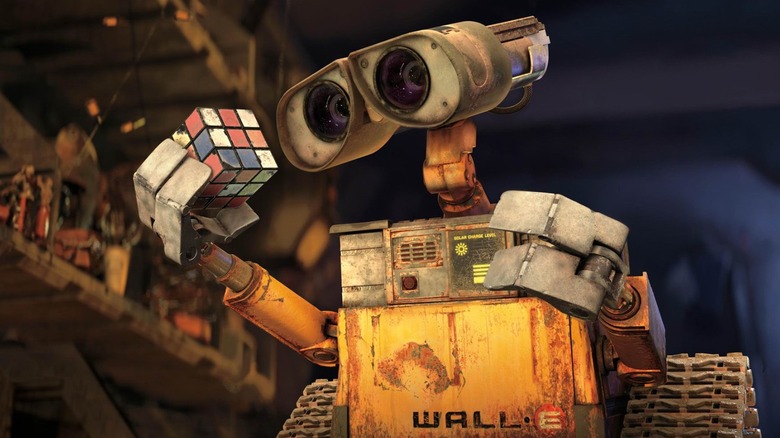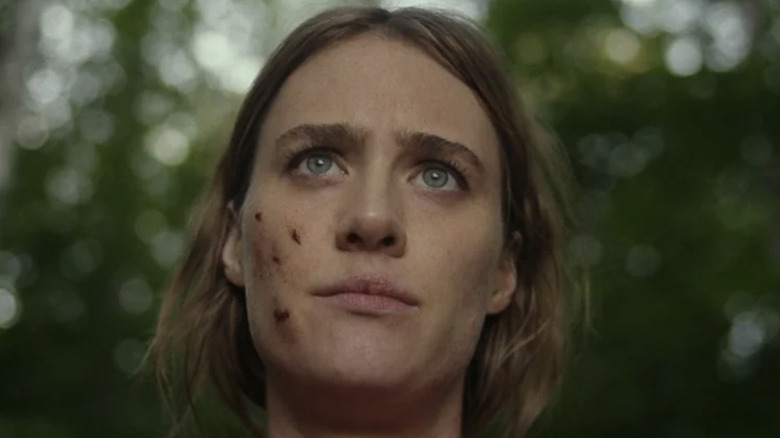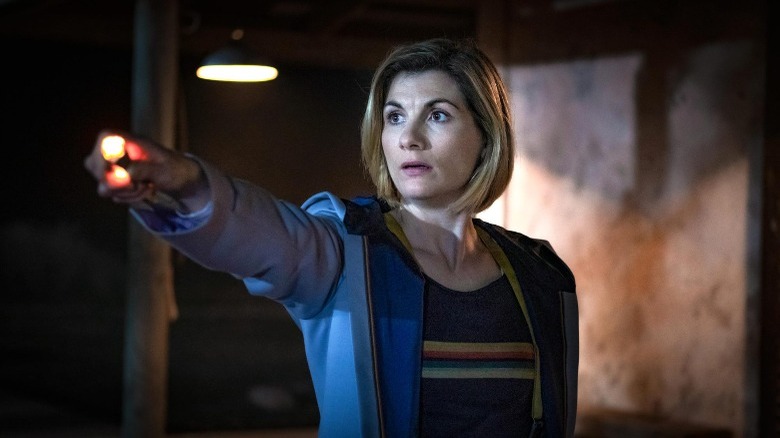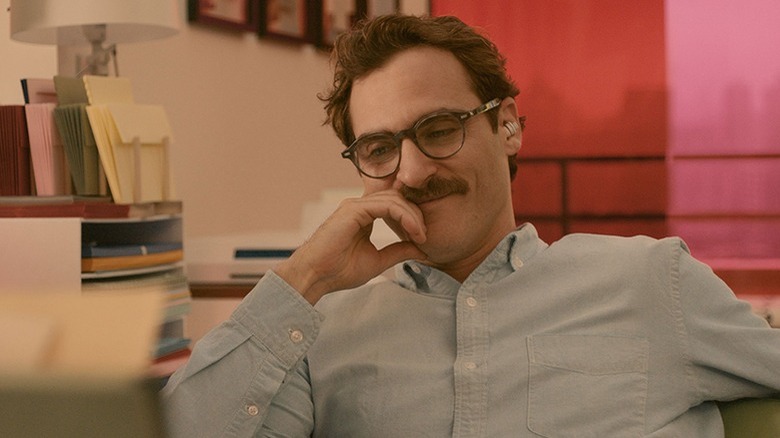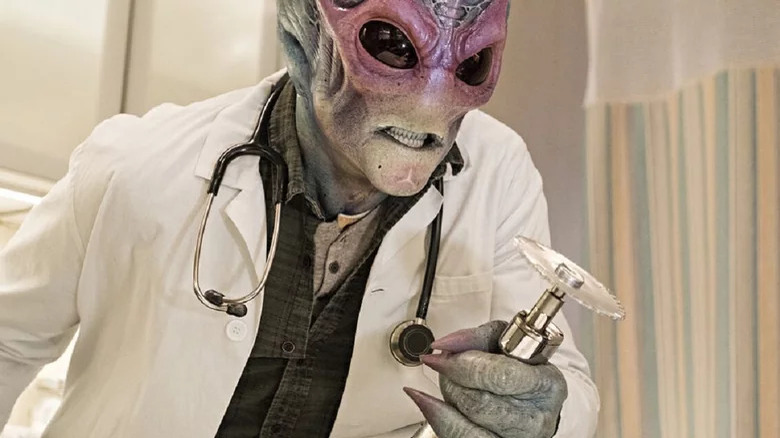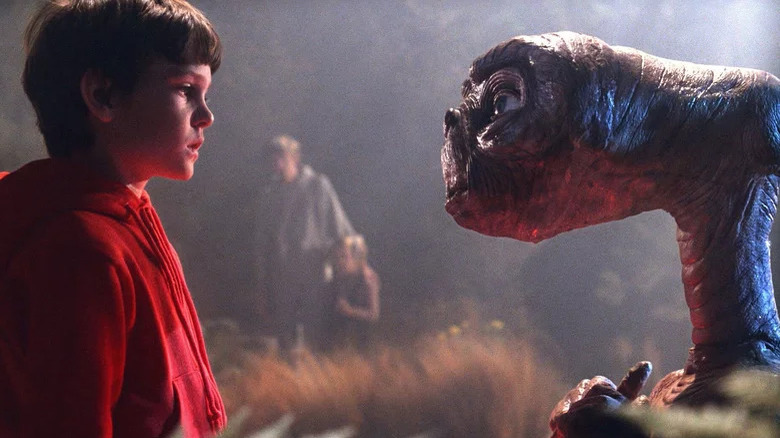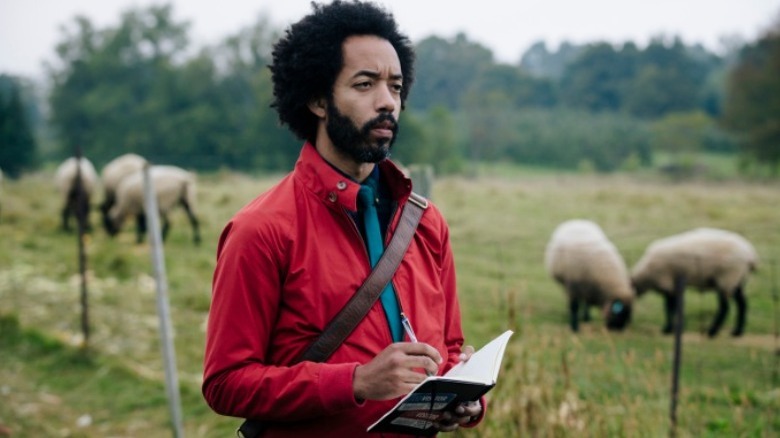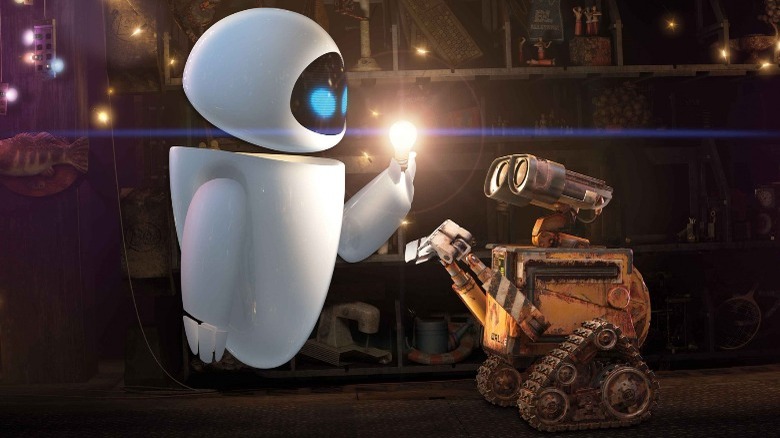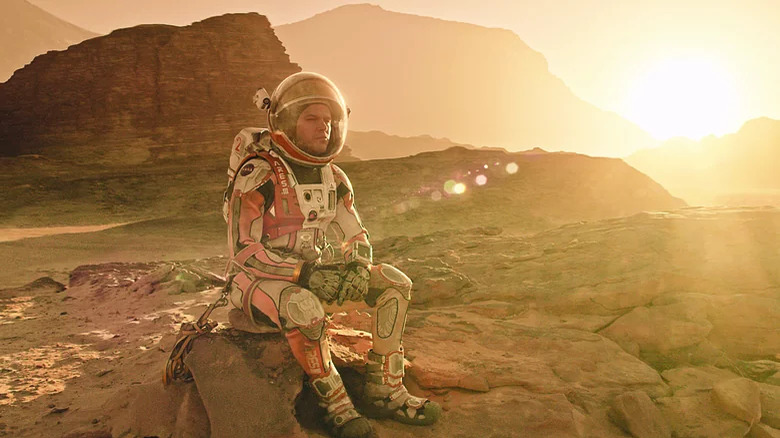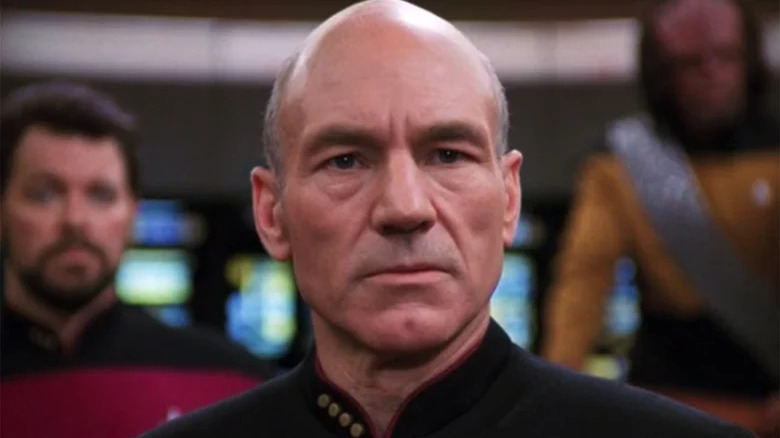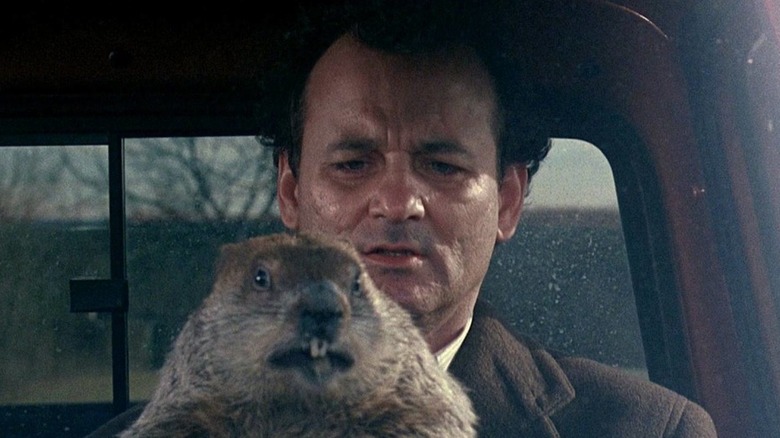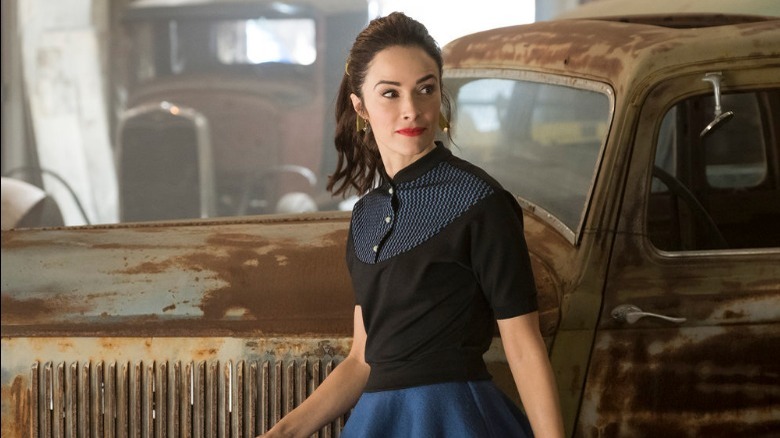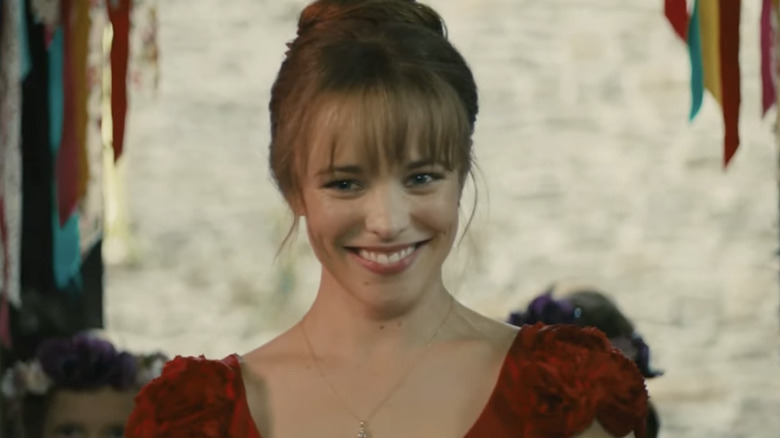Sci-Fi Movies And Shows That Are Actually Uplifting
Science fiction is about confronting the unknown. Whether it's exploring space, extraterrestrial life, artificial intelligence, or some other paranormal phenomenon, sci-fi tends to be hazardous and dangerous. More often than not, this leads to work that's bleak and unforgiving. There may be glimpses of warmth and happy endings tacked on, but it can be punishing to watch the world subsumed by zombies or invaded by aliens. The unknown turns out to be threatening and hostile time and time again: Aliens nearly always want to mine Earth for resources or people, A.I. wants to enslave humanity, and so on.
It can be cathartic to watch characters survive in the most dire of circumstances. But if the tone of the movie or show is as grim and unrelenting as its supernatural threat, it doesn't really offer much escape from the doom-scrolling many are doing in reality. Ideally, even the most far-fetched stories about humans (or humanoid-ish characters) should have something for those of us in this world to connect with, so we can learn or feel enriched. In fact, the best science fiction is as much about what it's like to be human as it is about its outlandish premise.
This type of science fiction creates worlds with people, who feel as real as their spaceships, time devices, or other fictional elements. Like the best stories in any genre, they create a world that is comforting to live in for a little while, but that also make you more excited to be cast back into this one when it's over. So, here are some sci-fi movies and shows that are actually uplifting.
Station Eleven
Perhaps the last thing anyone expected in 2021 was to fall in love with a miniseries about a global flu-like pandemic, but HBO Max's "Station Eleven" won our hearts nonetheless. Jumping around in time from the beginning of a "Georgian flu" that has an extremely high death rate, "Station Eleven" has a unique cathartic appeal. Unlike "Contagion" or other similar fare, "Station Eleven" pushes through the clinical coldness of documenting the collapse of society into the flickering, hopeful warmth of the fragments of humanity that survive.
It does this despite the mass amounts of death and the period of brutality that might follow such a catastrophic event. While the only literal "science fiction" element in the show is the hypothetical virus that ends the world, the series also features a sci-fi text within the text: a graphic novel called "Station Eleven" that follows various characters on a broken-down space station, who are also dealing with time, loneliness, and societal collapse. This story of a mysterious figure in a spacesuit named Dr. Eleven becomes an allegory that lets various "real" characters — the ones who read this graphic novel — express their own feelings. These characters also perform scenes from "Hamlet" at various points, and use a key scene — where the Danish prince meditates on grief — to add even more layers to the story of this series.
"Station Eleven" is told out of chronological order and doesn't involve a particularly action-packed plot. But when two characters reunite in the finale, you'll probably raise your arms in excitement as if you're watching the Super Bowl. It's the show we needed during this halted, extended quarantine: so surreal that it feels like dreaming and filled with characters so real, we can't tell it apart from our own reality.
Doctor Who
"Doctor Who" is a testament to eternal optimism. The show is a significant part of British pop culture, as it has spent decades on the air since its premiere in 1963 (via The Museum of Broadcast Communications). The titular Doctor — a rogue Time Lord, who has now been played by thirteen different actors — is like a time and space-traveling version of the classic Western hero, who wanders from place to place, solving problems and fighting injustice with ingenuity. The Doctor's relationship with human companions are rooted in deep friendship and occasionally romantic love. It's a show about the power of determination and science to beat all odds.
In a world of endless "gritty reboots" of beloved intellectual property, "Doctor Who" remains committed in every incarnation to a certain innocence and sense of fun that most other adult entertainment lacks. It manages to get away with a usually cheap effects budget and a certain BBC cheesiness, while being compelling and dramatic at the same time. "Doctor Who" has the sense of adventure that the best space operas of the '70s promised, and an infectious outlook that will stick with you. To quote the Doctor himself (in his 11th manifestation): "I am and always will be the optimist. The hoper of far-flung hopes and the dreamer of improbable dreams."
Her
"Her" is a modern masterpiece about living our lives with digital voices in our ears, and handing the most intimate parts of ourselves over to the algorithm. Set in a near future that's basically just our current reality with a better sense of design, "Her" follows a lonely and isolated man, Theodore. He installs a new OS on his computer and phone that includes a virtual assistant with true artificial intelligence: a Siri or an Alexa that can really think, learn, and even fall in love. The devices we use contain an almost infinite amount of information about our thoughts, preferences, memories, and lives. So, if a computer program had true consciousness, we would experience a strange and new sort of being "seen" by this thing that already knows us in such detail.
"Her" covers a staggering amount of philosophical ground considering it's telling a simple love story. Its human protagonist learns to love again after a divorce, and he finds a way to connect with reality and the people in his life by virtue of this new technology. The A.I. character deals with even bigger things, like what it means to be alive, to learn and grow, and to love and place no bounds on your capacity to love. Ultimately, the movie explores something profound about the nature of consciousness, which transcends the nature of reality as we understand it. At no point is there a "Terminator" style singularity where anyone enslaves anyone else, and the story is all the better for it.
Resident Alien
It can be a fundamentally strange thing to be alive. We wake up as self-aware animals, and have to remember several centuries' worth of information, customs, and social contracts just to make it through the day. In a certain way, there may be no more relatable character than an alien posing as human, since that's how it feels to be human a lot of the time. Syfy's "Resident Alien" is a hilarious and heartwarming story about that exact scenario.
Alan Tudyk – beloved in sci-fi fandoms for roles on shows like "Firefly" and "Dollhouse" — stars in a long-awaited leading role that makes full use of his talents. With an elastic face and mellifluous voice, Tudyk very believably portrays a being that is stumbling through every aspect of being human for the first time. Like many fictional aliens, he learns language from old TV episodes, developing an enduring obsession with Jerry Orbach from "Law & Order" in the process, and soon learns what it's like to develop human connections and relationships in the small town of Patience, Colorado. The plot of the show includes some fairly typical hidden-identity intrigue and world-ending stakes, but the relationships between the characters are what make this show unique.
E.T. the Extra-Terrestrial
It's a testament to the greatness of "E.T. the Extra-Terrestrial" that it's one of the biggest movies of the '80s, which has never been rebooted or remade for a new audience. A timeless story of interspecies friendship, "E.T." is a family-friendly tale of the enduring relationship between a 10-year-old boy named Elliott and its titular alien, who bond with just a few lines of dialogue and a telepathic connection. Instead of hostile invading aliens, the meddling U.S. government serve as the villains of the film, as they nearly kill E.T. by locking him up for scientific study.
"E.T." is at once both hilarious in the way it puts Elliott through misadventures caused by E.T.'s telepathic abilities, and bittersweet in its simple story of a friendship with an emotional farewell. A landmark of pop culture, it spawned shameless imitations in the '80s like "Mac and Me" and "Flight of the Navigator." More recently, it's been responsible for an entire wave of nostalgia in film and TV of the "suburban kids team up" sci-fi genre, from "Super 8" to "Stranger Things." But if you haven't seen the original or just haven't seen it in a while, put on "E.T." and keep some tissues handy.
People of Earth
"People of Earth" focuses on group therapy sessions for alien abductees, or "experiencers," as they prefer to be called. Group therapy makes for an eternally great recurring backdrop for a very funny sitcom, and as a premise, it also allows the show to explore the line between madness and truth. You learn early in the pilot that aliens are, in fact, real. But the ways in which the group members deal with patches in their memory, and ways that the extraterrestrial conspiracy becomes entwined with their lives, are far more interesting than whatever the aliens' goals or threats might be.
"People of Earth" even quickly "humanizes" (so to speak) the various aliens that we meet. In a tone reminiscent of "The Office" and other droll workplace sitcoms, the aliens navigate a complicated bureaucracy and squabble internally, as they go about covering up their various experiments on humans. While the series only ran for an all-too-brief 2 seasons on TBS, "People of Earth" has a tone that merges the dry silliness of "The Hitchhiker's Guide to the Galaxy" with the manic emotional swings of "Community," and it is a gem that you shouldn't miss.
Wall-E
The premise of Pixar's "Wall-E" is so different from the feeling the movie evokes that watching it can generate cognitive dissonance. In a chilling vision of the future, humanity has polluted the Earth beyond repair and abandoned the planet, fleeing on giant luxury space-cruisers. A lone robot remains back on Earth, as he has been designed to condense garbage into compact cubes and stack them on top of one another. The first half of "Wall-E" follows this titular, adorable robot in his solitary existence. It's a strange and poignant silent movie about a lovable, Charlie Chaplin-esque tramp.
The second half follows Wall-E and a new friend, as they explore one of the vast spaceships on which humanity survives. It's another surreal comment on our contemporary existence: Humans have all become sedentary wastes of space, who never leave their floating recliners or look away from their various screens. The movie is not subtle whatsoever, but it's also not mean-spirited at heart. Without much dialogue, "Wall-E" carries a deep message about curiosity and perseverance, and manages to be as tear-inducing as every other Pixar classic. It touches on a hope that we can switch off our collective autopilot and rebuild the world, no matter how late it gets.
The Martian
"The Martian" is a movie for every kid that had their own toy microscope or chemistry set, who spent hours classifying bugs and building absurd geometries out of Erector sets, Legos, or Minecraft blocks. Ridley Scott's adaptation of Andy Weir's novel is as straightforward and science-positive as its source material. Matt Damon plays an astronaut named Mark Watney, who gets stranded on Mars and has to use all of his wits, along with his advanced degree in botany, to survive. Andy Weir, a former computer programmer, did extensive research into all of the botany, physics, and logistics of space flight that go into the story, and it shows in the final film.
It's a different spin on the "survival in space" genre that usually makes peril the main attraction, not scientific know-how. A lot of science fiction is about the tension between what we're capable of, given our understanding of science as we know it, and what we'd do when faced with some new paranormal or unexplainable threat. "The Martian" — a fictional take on a scenario that's become more plausible with every passing year — is a triumphant speculation on what we've accomplished so far.
Star Trek: The Next Generation
Of all the "Star Trek" series, "The Next Generation" is the most comforting and statesmanlike, as it's the most dry and intellectual in its dedication to philosophical debate. A large part of that quality comes from the inimitable Patrick Stewart in his iconic role of Captain Jean-Luc Picard, who brings all of his Shakespearian import and gravitas to even the wackiest of holo-deck episodes. "Star Trek: The Original Series" had a certain silliness and lurid '70s tone, and a lot of the later "Star Trek" movies and series go for the jugular with interstellar war and space-fighting. "The Next Generation" has plenty of that too, but at its core, it captures something innocent and positive that's aligned with the spirit of its late '80s and early '90s heyday.
If you've never made the plunge, there are 7 seasons and 178 episodes of pure "Star Trek" idiosyncrasy to enjoy. If that's not enough, the main cast starred in four movies as well as the recent spinoff series "Star Trek: Picard," which follows the famous captain through a turbulent retirement. Whimsical, languid, and unapologetically nerdy, "Star Trek: The Next Generation" is the franchise at its Star-Trekkiest.
Groundhog Day
For many, "Groundhog Day" is the benchmark by which all other time loop stories are judged. Its influence has been so effective that people are more likely to say "I feel like I'm in Groundhog Day" than "I feel like I'm caught in a loop" when describing that feeling of the days blending together. It's universal to start to feel strange when you repeat the same behaviors, at the same time, day after day after day, and Bill Murray's consternated fury as weatherman Phil Connors stands in for our own human rejection of monotony.
Unable to escape the endless repetition of the same day by action or even death, Phil eventually realizes that time is an advantage. He learns skills, gets to know everyone he comes into contact with, finds good deeds that need doing, and ultimately, he makes himself whole. It might be a stretch on the face of it to call "Groundhog Day" science fiction, since the time loop is never explained. It might be more like "magical realism" if you want to get technical. But the movie delivers such a heartwarming, compelling message in the guise of a classic comedy that you can't help but give it a pass.
Timeless
For a period of time, "Timeless" existed on NBC as a wholly American version of "Doctor Who." At times cheesy and a little silly, it hops from one iconic event of U.S. history to the next in a freewheeling adventure that plays out like a list of "top time travel tourist destinations." The Hindenburg, Lincoln's assassination, Charles Lindbergh's flight, Watergate, and Jesse James all show up in the first season alone. Although the serialized plot involving the rogue "time terrorist" that our team of heroes is trying to stop remains pretty murky for a while, each episode is self-contained in a different time period, which makes the show easy to follow. It's like a time-hopping version of "Where in the World is Carmen San Diego?".
While there are serious consequences to time travel even in the rollicking logic of "Timeless," it's never presented with the grim or self-serious dystopian finality of alternate history stories like "The Man in High Castle." Instead, "Timeless" offers a true "what if?" storytelling exercise each episode that's brightly colored and has an earnest pluck at its heart. Abigail Spencer, after a small part on "Mad Men" and a leading role on "Rectify," shines the brightest out of the cast as a historian struggling to keep track of all the changes caused by the chaos.
About Time
Richard Curtis — of "Love Actually" fame — wrote and directed "About Time." In the same spirit of "Groundhog Day," it's a movie that is nominally science fiction in that it's about a man that travels in time, but it's really a philosophical statement about how to live life, all disguised as a romantic comedy. Domhnall Gleeson stars as a young lawyer, who possess the ability to relive parts of his own life over. No killing Hitler or anything outlandish, but anything he gets wrong, he can go back and try again. It's a depiction of the universal temptation to go back to the moments in our lives that trouble us or that we'd do differently as older or cannier versions of ourselves.
The true genius of "About Time" is that it arrives at the conclusion that happiness is in being present, not in ruminating endlessly on the past. There's only so much you change, no matter how many chances you get: It turns out that no amount of time travel will make Margot Robbie fall in love with you, but you might meet Rachel McAdams instead. "About Time" dispatches with the idea of romance in its third act, as it gets into deeper and thornier questions about grief, life, and happiness itself. It even outlines an approach to the punishing mundanities of everyday life that anyone can employ, time traveler or otherwise.
